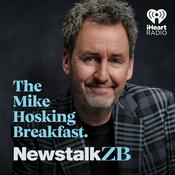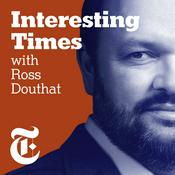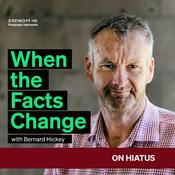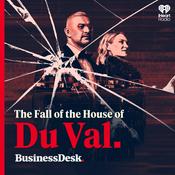139 episodes
- New Zealand loves to boast about its clean, green energy story. With around 80 to 90% of grid electricity coming from renewable sources like hydro, wind and geothermal, we look like one of the world’s quiet success cases on decarbonisation.
But beneath that headline number lies a much more precarious reality. When lake levels fall and gas supplies tighten, our energy system starts to look very exposed.
In the latest episode of The Business of Tech, I sit down with Melissa Reynolds‑Clarke and Daniel Gnoth from Ara Ake, the national centre for energy innovation, to explore how we can lean on innovation to navigate this emerging energy crunch.
The conversation ranges from process heat in dairy factories and meat plants that still run on coal and gas, to the growing risk that international customers will turn away from products that are not backed by genuinely low‑emissions energy.
Ara Ake sits in the “valley of death” for new technology – that tough space between promising lab results and commercial deployment. Daniel explains how the organisation supports everything from fusion “moonshots” and hydrogen‑electric aircraft trials, to more grounded projects like battery storage at Wellington’s CentrePort, rural microgrids, and ultra‑cheap hot water control that effectively turns our cylinders into a giant, flexible battery. Melissa, drawing on decades in the rural sector and on energy company boards, highlights the brutal realities facing farmers and manufacturers who need affordable, reliable energy today, even as they’re pushed to decarbonise for tomorrow’s markets.
We dig into some of the most promising levers for fast impact – smarter use of flexibility on the grid, re‑using old oil and gas wells in Taranaki for deep geothermal heat, and new business models that make technologies like biodigesters and community batteries actually stack up in a country of small, dispersed farms and towns. We also talk frankly about the capital gap that still exists between startup and scale‑up, and why system‑wide thinking across regulation, networks, and markets, matters just as much as shiny new tech.
If you want to understand what New Zealand’s energy transition really looks like on the ground, and where innovation can genuinely move the dial, this episode is for you. Streaming on iHeartRadio or wherever you get your podcasts.
Show notes
Who builds NZ’s LNG terminal? The two names being floated - BusinessDesk
New liquefied natural gas terminal: 'Vital' or 'bonkers'? - RNZ
Why the new LNG terminal could raise, not lower, your power bill - Newsroom
Ryan Bridge: The Taranaki LNG terminal is a good idea, depending on who you ask - NewstalkZB
Second interim boss appointed at Ara Ake as work continues to find next CEO - The Post
Energy research centre Ara Ake secures $70 million in funding to support innovation - Stuff
Ara Ake Impact Report 2025 - Ara Ake
See omnystudio.com/listener for privacy information. - In the latest episode of The Business of Tech, we look at the rise and fall of MethaneSAT, the $30 million national space project that was supposed to cement New Zealand as a serious spacefaring nation.
Instead, it became a case study in governance failure, misaligned incentives and lost opportunity.
Launched in March 2024 and lost in June 2025 after persistent spacecraft glitches, MethaneSAT’s methane-sniffing science payload worked but the rest of the system carrying it in space failed.
Working in space is risky, and satellites do fail. But as this week’s guest on The Business of Tech, University of Auckland physics professor Richard Easther points out, New Zealand’s involvement in the international MethaneSAT project raised questions from the start.
“What happened… is that we found this opportunity and then we found reasons to do the opportunity,” he told me.
“If someone had come to us in 2018 and said, here’s $30 million, I want you to develop things that will lead to startups, things that will provide the workforce… we could have come up with a plan and it would have been much, much better than MethaneSAT.”
Picking winners: "A terrible job"
Easther is careful not to scapegoat individual scientists or engineers. His critique is aimed squarely at how New Zealand chooses its science priorities and partners.
“We do a terrible job of choosing science priorities in New Zealand,” Easther said.
“And the people who pushed MethaneSAT were not scientists and do not have visible track records of testing proposals for excellence and competence.”
From governance issues to the gap between what officials were told privately and what the public heard, Easther argues MethaneSAT exposed deep problems in how we govern high‑risk, high‑cost science.
But this isn’t just a post‑mortem of a failed satellite. Easther draws a direct line from MethaneSAT to today’s multi‑million‑dollar bets on AI and quantum, warning that without transparent, contestable processes – of the kind used in US “decadal reviews” – New Zealand risks repeating the same mistakes at even larger scale.
The Government yesterday announced another significant science investment, committing $35 million from the Regional Infrastructure Fund to help start-up OpenStar Technologies develop a new, specialised facility for its new fusion machine.
Easther says major science investments shouldn’t come at the cost of long‑term, curiosity‑driven funding, pointing to world‑leading local strengths in high‑temperature superconductors and quantum devices that were quietly underwritten by the Marsden Fund decades ago.
Tune in to The Business of Tech to hear Professor Richard Easther on what MethaneSAT got wrong, and what we should learn from it. Streaming on iHeartRadio or wherever you get your podcasts. Thanks to our sponsor 2degrees.
Show notes
An eye in the sky to detect methane emissions - RNZ
Taxpayer-funded climate satellite MethaneSAT finally reveals what's behind delays - RNZ
Taxpayer-funded satellite had 'deep-seated problems' from launch - RNZ
MethaneSAT Report: Advancing space capability and climate science - MBIE
Government pulls back from full membership of Square Kilometre Array - RNZNew Zealand pulls out of the Square Kilometre Array after benefits questioned - Physics Today
See omnystudio.com/listener for privacy information. - Two Kiwi engineers who helped build the future of self‑driving cars in Silicon Valley are now quietly laying the foundations for the next great tech wave: physical AI.
In the latest episode of The Business of Tech, I talk to Harry Mellsop, co‑founder of simulation startup Antioch, and Adrian Macneil, co‑founder and CEO of data platform Foxglove, for a fast‑paced tour of where robotics is really at as Elon Musk talks up his Optimus humanoid robots.
Both founders cut their teeth at the pointy end of autonomy. Harry worked on Tesla’s Autopilot, watching first‑hand how much time and money is burned putting robots into the real world safely. Adrian led key parts of Cruise’s self‑driving infrastructure and developer tooling, helping build the internal platforms that let engineers understand what a robot “saw”, “thought” and did on the streets of San Francisco.
Big dollars for physical AI startups
That experience has now crystallised into two companies sitting at the infrastructure layer of physical AI – and investors are paying attention. Foxglove has raised US$40 million US in Series B funding, led by Bessemer Venture Partners with Icehouse Ventures on the cap table, to build the data and observability backbone for robotics teams. Antioch has secured US$4.2 million US dollars in pre‑seed funding, with Icehouse Ventures again involved, to bring Tesla‑grade cloud simulation to any robotics startup that wants to test thousands of edge cases virtually before a robot ever leaves the lab.
Integration testing for atoms
We explore how these platforms turn messy real‑world sensor feeds into structured insights, shorten development cycles from weeks to hours, and dramatically reduce the risks of unleashing autonomous machines into warehouses, construction sites and farms. Harry explains why “integration testing for atoms” is the missing link in robotics, and how simulation can slash the cost of safety validation. Adrian unpacks the idea of a data flywheel for robots – logging everything, surfacing the rare but dangerous failures, and feeding that back into better models and better code.
If you want to know where AI goes next, why humanoids are still relatively clunky despite the viral demo videos, and how New Zealand founders are quietly shaping the infrastructure every serious robotics company will rely on, tune into episode 133 of The Business of Tech, streaming on iHeartRadio or wherever you get your podcasts. Thanks to our sponsor, 2degrees.
Show notes
Kiwi Harry Mellsop raises $7.3m for his physical-world AI start-up Antioch - NZ Herald
Physical infrastructure AI firm Foxglove, headed by Kiwi Adrian Macneil, raises US$40m - NZ Herald
The Missing Infrastructure Holding Robotics Back with Adrian Macneil - The Machine Minds Show
Rise of the robots: the promise of physical AI - AFP
Physical AI: robotics are poised to revolutionise business - FT
Humanoid robots take over CES in Las Vegas as tech industry touts future of AI - CNB
See omnystudio.com/listener for privacy information. - New Zealand likes to see itself as an agile, innovative tech nation. But when it comes to artificial intelligence, the story is more sobering than triumphant.
A new survey of 4,000 business leaders from around the world by research group IDC has revealed that just 8% of companies in Australia and New Zealand can be classified as “frontier firms” when it comes to their uptake of AI. That compares to the global average of 22%. Around half of our firms are classed as “laggards” and risk falling behind.
Are we shrewdly waiting on the sidelines for AI to really prove its worth. Or are we merely dabbling with the tech, ill-equipped to embed it in our businesses?
AI can be more than “fancy Google”
In the first episode of season 4 of the The Business of Tech, I sit down with Sarah Carney Microsoft’s national chief technology officer, to explore an uncomfortable question: are Kiwi companies quietly locking in a decade of underperformance by moving too slowly on artificial intelligence?
Carney has a front‑row seat to how “frontier firms” around the world are using AI to rewire their businesses, not just write better emails. In this episode, Carney, a ten-year veteran of Microsoft, spells out why that matters for jobs, growth and competitiveness.
She also challenges some of the myths holding local leaders back. Is AI really a threat to entry‑level roles, or could it create better ones? Is governance a brake on innovation, or actually the catalyst that lets people take bolder bets? And why is our national cynicism becoming a liability in a world where experimentation is the new survival skill?
If you’re a founder, executive, policymaker or just trying to work out what AI really means for your job and your business in 2026, this is an episode you do not want to miss. Streaming on iHeartRadio or wherever you get your podcasts. Thanks to our sponsor 2degrees.
See omnystudio.com/listener for privacy information. AI slop, smart rings and riding the S-curve: The year in tech and what’s ahead
17/12/2025 | 1h 4 mins.“Never a dull moment” is how Wellington-based veteran consumer tech reviewer and commentator Pat Pilcher describes the year in tech after relentless product launches, an “utterly insane” Black Friday sales season and the “enshitification” of the internet, thanks in large part to AI.
In our final episode of The Business of Tech for 2025, Pilcher joins the show to break down the biggest trends of 2025 and what’s coming in 2026, from AI agents and smart rings to humanoid robots and the debut of solid‑state batteries.
Apple, AI and the year of the fold
Pilcher starts with the elephant not in the room: Apple’s slow play on generative AI.
“Every tech player and their pet poodle had an AI offering except Apple,” he said. “This is just crazy. This is a company that sets the trends that everyone slavishly follows, and they missed the bus on the biggest AI trend probably of the decade.”
Yet he thinks there is method in the apparent madness, arguing that “stepping back… until they get a mature offering” may prove “quite sensible” in such a fast‑moving space.
That patience, he predicts, will collide with hardware in 2026. Pilcher is convinced 2026 is going to be the year of the iPhone fold, following in the wake of foldables leader Samsung.
AI slop, deepfakes and the S-curve of tech adoption
AI dominated 2025, working its way along the classic S‑curve of technology adoption. While an enthusiastic user of generative AI tools, Pilcher is blunt about the downsides, from “AI slop” filling Facebook, X and LinkedIn to academics “pulling their hair out” as students outsource learning to chatbot tools.
With hyper‑realistic video models like Sora3and an election year looming, Pilcher says “the general public needs to be a lot more critical, a lot more sceptical – and they’re not”.
Pilcher chooses Cory Doctorow’s famous term “enshittification” to sum up a key, regressive trend of 2025.
“You subscribe to a service, it sounds fantastic and it’s only $5 a month. Three months later, it’s $25 a month, does less, requires more of your information and they can’t guarantee your privacy and by the way, your password’s been stolen,” he said.
Pilcher sees this as evidence that the business model underpinning AI is dubious, with companies investing “billions and billions of dollars in massive data centres” in a period of “geopolitical instabilities and macroeconomic instabilities”.
Silicon became “the new global currency” in 2025, from Nvidia’s dominance to Google’s Tensor processing units (TPUs) and China’s push to go beyond 40nm (nanometers) under US export bans.
Smart glasses, smart rings and genuinely smart homes
If 2025 was AI’s year, Pilcher also thinks it was when home and wearable tech quietly levelled up. He rates Meta’s new Ray‑Ban smart glasses, which can describe what you’re looking at and translate signs on command. Future prototypes, he notes, combine wristbands that track “tendon movements” for hand‑gesture interfaces with augmented reality (AR) overlays that could do everything from lie detection in negotiations to live 3D navigation in unfamiliar cities.
Smart rings are another sleeper hit, with Pilcher praising rings for being “unobtrusive” and “tiny” while monitoring health stats well enough to “tell you proactively when you’re coming down with a cold or a flu a week before you start noticing symptoms”. In his own testing, backed by a blood‑pressure cuff and digital thermometer, a smart ring delivered accurate results.
On the home front, Pilcher says the long‑promised smart home is finally here, thanks to the Matter standard, which means new gadgets “will basically work regardless if you have an Alexa, Apple, Siri or… Google Home”.
EVs, robots and the 2026 futures
Pilcher also covers the post‑rebate slump in EV sales, the rise of value‑packed Chinese brands like BYD, and the misinformation around EV fire risks, pointing out how a petrol vehicle, not a battery, was to blame in a widely shared bus fire incident.
Putting his futurist hat on, Pilcher talks about smart contact lenses with built‑in displays and gesture‑tracking bracelets that could make smartphones “look as quaint as a Model T Ford”, always‑on access to AR shopping lists and navigation, and the first serious wave of humanoid robots.
With cheaper AI silicon and compact models, he “wouldn’t be surprised if in late 2026… humanoid robots become the next must‑have consumer electronics category for the well‑heeled”.
He also expects to see the debut of solid-state batteries as an alternative to Lithium-ion batteries that power everything from laptops to EVs, expecting new breakthrough technologies to offer longer battery life and durability.
Tune in to Episode 131 of The Business of Tech, powered by 2degrees Business, for the full conversation with tech guru Pat Pilcher, streaming on iHeartRadio or wherever you get your podcasts.
See omnystudio.com/listener for privacy information.
More News podcasts
Trending News podcasts
About The Business of Tech
The Business of Tech, hosted by leading tech journalist Peter Griffin. Every week they take a deep dive into emerging technology and news from the sector to help guide the important decisions all Business leaders make.
Issues such as cybersecurity, retaining trust after a cyberattack, business IT needs, purchasing SaaS tools and more.
New Episodes out every Thursday. Follow or subscribe to get it delivered straight to your favourite podcatcher.
@petergnz
@businessdesk_nz
Proudly sponsored by 2degrees Business!
Podcast websiteListen to The Business of Tech, The News Agents and many other podcasts from around the world with the radio.net app

Get the free radio.net app
- Stations and podcasts to bookmark
- Stream via Wi-Fi or Bluetooth
- Supports Carplay & Android Auto
- Many other app features
Get the free radio.net app
- Stations and podcasts to bookmark
- Stream via Wi-Fi or Bluetooth
- Supports Carplay & Android Auto
- Many other app features


The Business of Tech
Scan code,
download the app,
start listening.
download the app,
start listening.




































